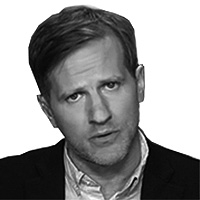There was something North Korean about the funeral cortege, with Hugo Chávez’s casket winding through the dilapidated streets of Caracas, Venezuela, followed by a crush of weeping, wailing supporters. For this final episode of The Hugo Chávez Show (Adios, Presidente!), the Venezuelan government again made use of the cadena—the requirement that every television and radio station carry the government’s propaganda feed—to send off their comandante. Mourners were interviewed, provided they were tear-stained and came only to praise their departed leader. No critics were given camera time; they never are.

So even in death, Chávez’s poisonous assault on the free press was subtly on display. The Committee to Protect Journalists concluded recently that the Chávez era left “a record of repression [and] control” of independent and state media outlets, a condition that seems not to bother some of his ideological sympathizers in the foreign media. It’s a predictable form of condescending orientalism: what chávismo has done to the Venezuelan media—and to civil society in general—is something his non-Venezuelan cheerleaders would never accept in their own countries.
But out they came to shout, ad nauseum, that Chávez was “democratically elected” while failing to point out that, by even the most expansive definition, he didn’t govern as a democrat—that rather important second step. He was a hero to the poor, commended impressive support both within Venezuela and abroad, and spoke of his loathing of Yanqui imperialism. And many Yanquis loved it.
I’ve collected five of the most absurd Chávez hagiographies (and one conspiracy theory), a list that could, rather depressingly, be much longer.
(1) The most astonishing entry comes from New York University professor Greg Grandin, writing in The Nation, who allows himself to “be perverse and argue that the biggest problem Venezuela faced during his rule was not that Chávez was authoritarian but that he wasn’t authoritarian enough.” If nothing else, one must give Grandin points for honesty and for bolstering Polish historian Leszek Kolakowski’s theory that such regimes must resort to authoritarianism to survive.
(2) In an unbylined piece at The Huffington Post, readers are told that “Hugo Chávez was a man of many talents: he played ball, sang songs, pulled out pistols, and got down and groovy—and that is precisely how we’ll remember the Venezuelan leader.” One can debate whether drawing a firearm counts as a talent, but The Huffington Post might want to remember Chávez’s reign, which was, in the words of Human Rights Watch, “characterized by a dramatic concentration of power and open disregard for basic human-rights guarantees.” How very groovy.
(3) The indefatigable British-Pakistani chávista Tariq Ali, writing in The Guardian, blubbered that Chávez “appeared as an indestructible ox, speaking for hours to his people in a warm, sonorous voice, a fiery eloquence that made it impossible to remain indifferent. His words had a stunning resonance. His speeches were littered with homilies, continental and national history, quotes from the 19th-century revolutionary leader and president of Venezuela Simón Bolívar, pronouncements on the state of the world and songs.”
And those watching television and listening to the radio, as noted above, had no choice but to listen. One can only imagine what Ali would have said if, during the 1980s, Prime Minister Margaret Thatcher, in her plummy and sonorous voice, commanded all media outlets to carry her speeches or risk being shut down. That would be fascism—but the “eloquent” and literate cadena is freedom.
4) Rep. José Serrano (D-NY) eulogized Chávez both on Twitter and in a press release: “He believed that the government of the country should be used to empower the masses, not the few. He understood democracy and basic human desires for a dignified life. His legacy in his nation, and in the hemisphere, will be assured, as the people he inspired continue to strive for a better life for the poor and downtrodden.”
Congress is clotted with buffoons, so it’s not surprising that the media often fails to give Serrano his due. Nor is it surprising that a man who once refused to acknowledge that Cuba isn’t a democratic country (“I don’t know ... I don’t live there”; “It’s a sovereign country”; “It’s a country with a different system than ours”), and who claimed that Castro’s one-party state indeed allowed freedom of speech, would lament the passing of el comandante.
5) And finally, instead of the predictable nonsense from Joe Kennedy, Oliver Stone, and Sean Penn, let us turn to one of Venezuela’s many authoritarian allies. PressTV, the reliably insane news service of the Iranian regime, speculated that Chávez was offed by the CIA’s give-cancer-to-Latin-American-leftists unit. The report, from former academic (and current Holocaust denier!) Kevin Barrett, isn’t without a qualification, though: “Am I 100% certain that the CIA killed Hugo Chávez? Absolutely not. It could have been non-governmental assassins working for the bankers.”
It’s worth noting that there have been a number of very smart analyses of Chávez’s legacy—start with Slate’s William Dobson, The Guardian’s Rory Carroll, Venezuelan journalist Francisco Toro, and The Economist. But the number of stupid columns, with the usual farrago of dubious numbers and boring bouts of semantic quibbling (dictator or democrat?), was indeed surprising, with their platitudes about Chávez not being perfect, but caring deeply about the poor (or my favorite, from an NBC News blogger, on his success in “strengthening cultural pride”).
And this is Hugo Chávez’s lesson for future authoritarians: make a mockery of democratic institutions, rewrite the Constitution, and persecute—and prosecute—your political enemies. But when you do so, make sure to mutter the appropriate things about poverty, “the empire,” and the scourge of “neoliberalism.” All will be forgiven.






